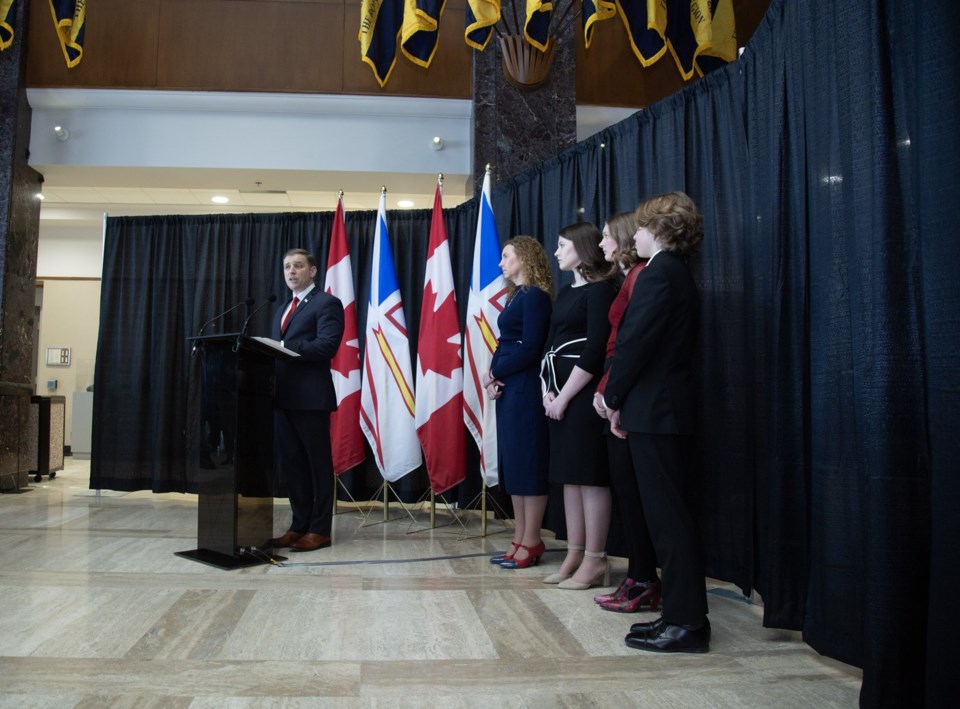ST. JOHN'S, N.L. — Newfoundland and Labrador Premier Andrew Furey is stepping down after nearly five years in power, saying the rigours of the job and the "bonkers" president of the United States helped inform his decision to resign.
Furey, an orthopedic surgeon, told reporters on Tuesday he has always maintained he is not “a career politician," explaining that he couldn't commit to another full term in office, with a provincial election scheduled to take place this year. He is the second premier in Atlantic Canada to resign within the last week, after Prince Edward Island Premier Dennis King stepped down on Friday.
Furey's resignation comes as the province, like the rest of the country, faces the threat of crippling 25 per cent tariffs from U.S. President Donald Trump, who said Monday that the tariffs are going forward on Canadian and Mexican goods next month.
Calling Trump an "erratic, crazy, bonkers president," Furey said the prospect of four years of Trump-fuelled uncertainty made his decision easier. However, he said he felt the province was in a strong position to persevere under a new leader.
"The guy's cracked," Furey said of Trump. "Whatever he says one day is not going to be accurate the next day. He makes promises, breaks promises, makes agreements, tears them up. People have to understand, that is going to be pervasive and consistent and it will last the full four years."
"Which is why I think the Canadian response needs to be calm, cool, measured, balanced but responsive in standing up to this bully — an erratic bully," he added.
Being premier has felt like "one five-year-long shift," Furey said in his resignation speech, as his cabinet ministers looked on. "You are always on. You are never off. You are with everyone for the celebrations, but often alone with the weight of the hardest calls," he said. "You go to bed with it on your mind, and it's your wake-up call every single morning."
The 49-year-old said it was time to return to his wife and three children — and the operating room, "where I will continue to serve the people of this province in a different way." He has no plans to run federally, and there are no electoral politics in his "immediate future," he said.
Furey's surprise decision to step down comes just months after he announced a sweeping new draft energy deal with Quebec that he said will open a new chapter in Newfoundland and Labrador's history. The agreement in principle will see Quebec's hydro utility pay much more for power from the Churchill Falls generating station in Labrador, promising about $17 billion in revenue from the new rates until 2041.
If finalized as hoped in 2026, the agreement will end a contract signed in 1969 that allowed Hydro-Québec to buy Churchill Falls power at rock-bottom prices for decades. The arrangement has loomed large in the collective psyche of Canada's easternmost province, and almost every premier since 1969 has tried unsuccessfully to accomplish what Furey did and end the agreement.
On X, Quebec Premier François Legault said he would remember "for the rest of my life what we accomplished together" on the new energy deal. "With this historic agreement, we have transformed the relationship between Quebec and Newfoundland, making it one of the strongest relationships in the country. Throughout the negotiation process, Andrew became a friend. I wish him the best of luck for things to come and a good time with his wife Allison!"
Furey's most meaningful accomplishment was bringing home the remains of an unknown Newfoundland Regiment soldier killed in the First World War, he said. The soldier died on the battlefields of France and was laid to rest in a tomb at the National War Memorial in St. John's, N.L., on July 1, which is Memorial Day in Newfoundland and Labrador.
"I hope my legacy is returning one of our own home, and helping close that wound," he said, his eyes tearing up. "I still get emotional thinking about it."
He also hopes he will be remembered for the pace at which his government made changes and accomplishments, he said. For example, the province's population began increasing in recent years after decades of decline, thanks largely to immigration efforts that included relocating Ukrainians fleeing the Russian invasion.
Furey was a political rookie when he won the Liberal leadership race in 2020 and subsequently became premier. He won in a provincial election the following year, which was delayed by the COVID-19 pandemic. He said Tuesday that he has asked the Liberal party to begin a race to replace him, and he will remain premier until his replacement is chosen.
It's not yet known who might step up for the role.
Deputy premier Siobhan Coady said there are plenty of experienced leaders in the Liberal caucus.
"I'm sure all of us will consider this over the next number of days and weeks," Coady, who is also the finance minister, told reporters. When asked if she'd run to replace Furey, she said his announcement was a shock and she hadn't yet had a chance to discuss a leadership run with her husband.
This report by The Canadian Press was first published Feb. 25, 2025.
Sarah Smellie, The Canadian Press
